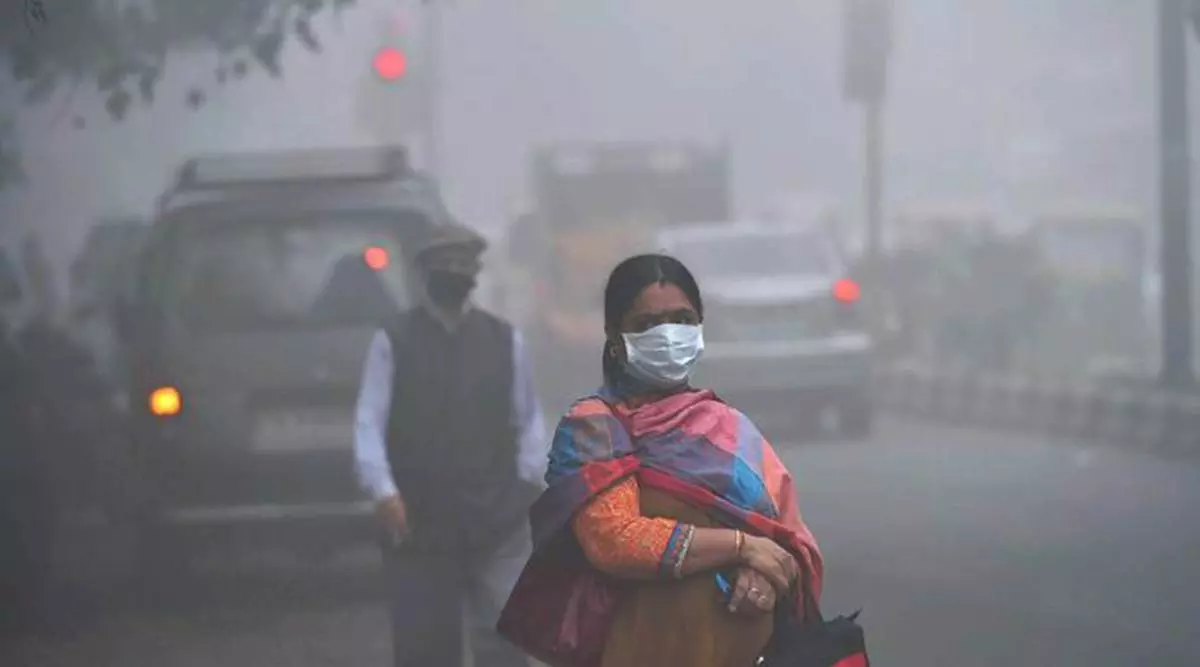
Air pollution in Delhi. File photo
Delhi air quality worsens; govt announces early winter break for schools
The air quality in Delhi and its suburbs dropped to the severe category again on Wednesday, with smoke from post-harvest paddy straw burning in other states.

The Delhi government on Wednesday (November 8) sent officials to restart an anti-smog tower located in the city’s heart, a day after the Supreme Court ordered it to be made functional again to arrest the choking pollution.
Delhi Environment Minister Gopal Rai also called an urgent meeting on Wednesday to discuss the implementation of the odd-even car rationing scheme to be enforced from November 13 to 20.
The anti-smog tower stopped operating following a direction given by Delhi Pollution Control Committee’s chairperson Ashwani Kumar without the knowledge of the Delhi government.
An official said the Delhi government officials would help to quickly restart the Rs 20 crore tower, which can reduce air pollution by 70-80 per cent in a 50-metre radius and by 15-20 per cent up to 300 metres.
Officials have also said the tower could purify air in a one-kilometre radius at a rate of around 1,000 cubic metres per second.
Meanwhile, Delhi schools will be closed from November 9 to 18 for an early winter break due to poor air quality.
Air quality
The air quality in Delhi and its suburbs dropped to the severe category again on Wednesday morning, with smoke from post-harvest paddy straw burning in neighbouring states accounting for one-third of the air pollution in the capital.
The city's Air Quality Index (AQI) stood at 421, worsening from 395 at 4 pm on Tuesday.
Delhi Minister Gopal Rai earlier alleged that Kumar, who became the DPCC head in December, halted the release of funds to IIT-Bombay and other agencies working on the tower without informing the government.
Chief Minister Arvind Kejriwal had inaugurated the over 24-metre-high tower at Connaught Place in August 2021.
Kejriwal has told the National Capital Civil Services Authority to suspend Kumar for shutting down the tower and stopping a study to ascertain pollution sources in Delhi.
The meeting called by Delhi’s environment minister will discuss the Supreme Court's observations regarding the odd-even scheme, which would have come into effect immediately after the Diwali festival.
Odd-even scheme
The odd-even scheme, first introduced in 2016, allows cars to operate on alternate days based on their odd or even number plates.
The Supreme Court on Tuesday questioned the effectiveness of the scheme, aimed at curbing vehicular pollution, and referred to it as "all optics".
Despite a marginal dip, the concentration of PM2.5, fine particulate matter capable of penetrating deep into the respiratory system and triggering health problems, has exceeded the government-prescribed safe limit of 60 micrograms per cubic metre by seven-eight times.
It was 30 to 40 times the healthy limit of 15 micrograms per cubic metre set by the World Health Organisation (WHO).
Several cities in Delhi’s vicinity reported hazardous air quality. These included Ghaziabad (382), Gurugram (370), Noida (348), Greater Noida (474) and Faridabad (396).
Experts say that stubble burning in neighbouring states, especially Punjab and Haryana, accounted for 37 per cent of the air pollution in the national capital on Tuesday. It is likely to be 33 percent on Wednesday.
Stubble burning
On Tuesday, the Supreme Court demanded an immediate halt to stubble burning in the states of Punjab, Haryana, Rajasthan and Uttar Pradesh.
The Energy Policy Institute at the University of Chicago and Evidence for Policy Design found that Delhi saw a 14-16 per cent fall in PM2.5 levels during the hours the odd-even scheme was enforced in an earlier period.
However, there was no reduction in pollution when the scheme was brought back three months later.
The Delhi government has also suspended in-person classes in all schools, except for students in grades X and XII preparing for the Board exams, until November 10.
The ministry of earth sciences has warned that the Delhi-NCR region is likely to face severe air quality for another five to six days.
Doctors say breathing in the polluted air of Delhi is equivalent to the harmful effects of smoking approximately 10 cigarettes a day.
Unfavourable meteorological conditions, combined with vehicular emissions, paddy straw burning, firecrackers and other sources add to hazardous air quality levels in Delhi-NCR during every winter.
Delhi's air quality ranks among the worst in the world's capital cities.
(With agency inputs)

